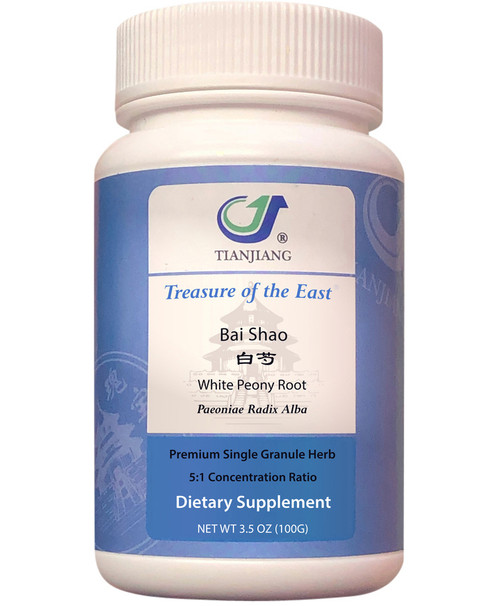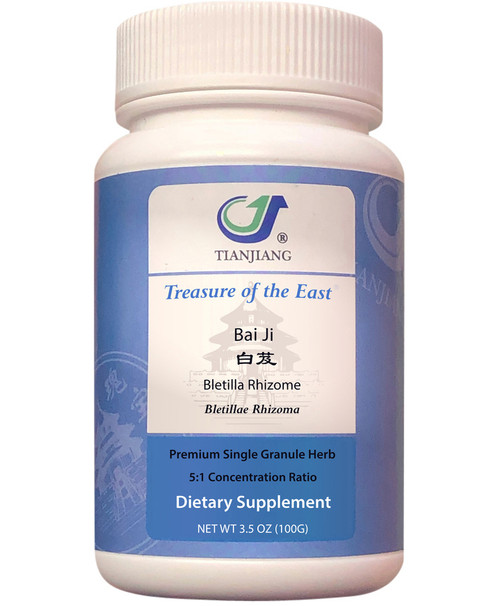
Product Description
Treasure of the East Bai Shao (sheng) Granules
Bai Shao (sheng) Granules , also known as Paeoniae Radix alba and used for the patterns of Blood deficiency, ascendant Liver Yang, constrained Liver Qi, or disharmony between the liver and Spleen.
Paeoniae Radix alba (bai shao) is bitter, sour, and cool it enters the liver channel where its sourness inhibits the yin. The Liver favors dispersal, and this quality is, in effect, tonified by an acrid flavor which encourages dispersal conversely a sour-inhibiting action has the effect of draining the Liver. At the same time, Paeoniae Radix alba (bai shao) also cools and nourishes the blood thus, it could be classified with equal validity as an herb that extinguishes wind, owing to its ability to nourish Liver blood and softens the Liver, thereby preventing the floating ascent of Liver yang. Transforming the Significance of Medicinal Substances observes: The slight bitterness of Paeoniae Radix alba (bai shao) tonifies yin, while its slight sourness restrains and inhibits. Because sourness travels to the Liver, short-term use will tonify the Liver [but] because the Liver\\'s nature favors dispersal and is averse to inhibition, this sourness is also used to curb the Liver. This is why it is said that Paeoniae Radix alba (bai shao) both tonifies and drains. The Liver governs the sinews, which cramp and spasm if unsupported by the Liver blood. This herb tonifies the Liver blood and thereby relieves pain due to acutely cramped sinews, or other pain associated with Liver blood deficiency, such as in the flanks and abdomen. The Liver stores the blood, and reduced blood storage can affect other important blood organs, such as the Heart, and the \\'sea of blood\\', which refers to the womb and its associated vessels. If the Heart lacks the support of Liver blood, palpitations and insomnia may result if the sea of blood lacks the support of Liver blood, menstruation can become irregular and cause supports fertility or abnormal menstruation. All of these disorders are appropriate for treatment with Paeoniae Radix alba (bai shao). Thus, one could look at the softening aspect of this herb as having an "unwinding" function, due to its dual tonification and drainage, that allows the Liver to soften up enough to accept the blood and store it, much like a sponge soaks up water. This herb also enters the Spleen channel and supports the Spleen when it is accosted by rebellious Liver qi. Rectification of the Meaning of Materia Medica notes that it "tonifies the blood and augments the true yin of the Liver and Spleen. In order to inhibit and contain the chaotic dispersal of the Spleen qi, or the unrestrained transverse rebellion of the Liver qi, Paeoniae Radix alba (bai shao) [is the herb to use]." It goes on to say that this herb is "bitter and slightly sour, [so that it] augments the yin of the greater yin Spleen, while holding in lax and dispersed great qi (da qi), and also augmenting the Liver yin and quieting its transverse rebellion. Because of its ability to cool, nourish, and restrain the yin, this herb is often used as an assistant in the treatment of sweating from various causes, such as spontaneous sweating from disharmony at the nutritive and protective levels, and nightsweats due to yin deficiency. Seeking Accuracy in the Materia Medica notes that, "together with cinnamoni ramulus (gui zhi), it inhibits sweating due to wind [pathogen] together with Astragali Radix (huang qi) and Ginseng Radix (ren shen), it restrains sweating from deficiency." --Bensky: Chinese Herbal Medicine Materia Medica, 3rd ed.
Unit Size:
100 grams (5:1 extract granules)
Serving Size:
As directed
Taste:
Bitter, Sour
Properties:
Slightly cold
Ingredients
Concentrated powders of natural herbal products tend to absorb moisture from the air. Hence, it is necessary for the manufacturer to add a suitable amount of excipient to stabilize the concentrated herbal products. Non-GMO starch which contains maltodextrin, are used as excipients.
Bai Shao
Patterns:
Blood deficiency Ascendant Liver yang Constrained Liver qi or disharmony between the Liver and Spleen;
Channel:
liver, spleen












